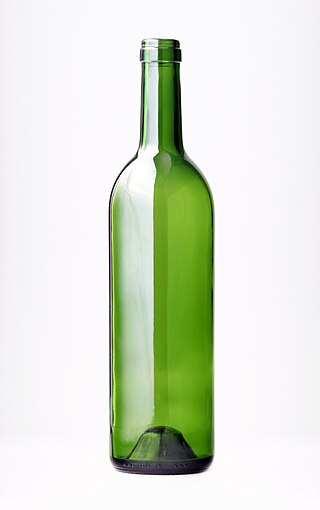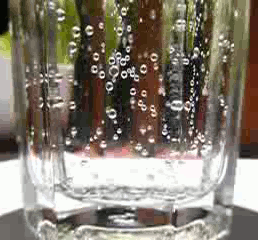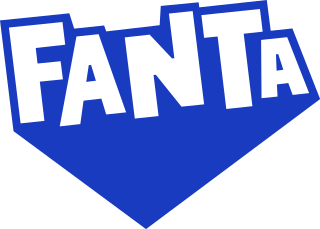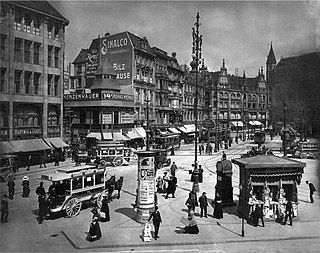
Coca-Cola, or Coke, is a cola soft drink manufactured by the Coca-Cola Company. In 2013, Coke products were sold in over 200 countries worldwide, with consumers drinking more than 1.8 billion company beverage servings each day. Coca-Cola ranked No. 94 in the 2024 Fortune 500 list of the largest United States corporations by revenue. Based on Interbrand's "best global brand" study of 2023, Coca-Cola was the world's sixth most valuable brand.

A soft drink is any water-based flavored drink, usually but not necessarily carbonated, and typically including added sweetener. Flavors used can be natural or artificial. The sweetener may be a sugar, high-fructose corn syrup, fruit juice, a sugar substitute, or some combination of these. Soft drinks may also contain caffeine, colorings, preservatives and other ingredients.

Jolt Cola was a carbonated soft drink produced by The Jolt Company, Inc.. The cola drink was created in 1985 by C. J. Rapp as a highly caffeinated beverage. It was targeted towards students and young professionals, stressing its use as a stimulant in a similar manner as energy drinks. Its slogan reads "All the sugar and twice the caffeine!"

Akvavit or aquavit is a distilled spirit that is principally produced in Scandinavia, where it has been produced since the 15th century. Akvavit is distilled from grain or potatoes and is flavoured with a variety of herbs. It is also popular in Northern Germany.

A bottle is a narrow-necked container made of an impermeable material in various shapes and sizes that stores and transports liquids. Its mouth, at the bottling line, can be sealed with an internal stopper, an external bottle cap, a closure, or induction sealing.

Carbonated water is water containing dissolved carbon dioxide gas, either artificially injected under pressure or occurring due to natural geological processes. Carbonation causes small bubbles to form, giving the water an effervescent quality. Common forms include sparkling natural mineral water, club soda, and commercially produced sparkling water.

Fanta is an American-owned brand of fruit-flavored carbonated soft drink created by Coca-Cola Deutschland under the leadership of German businessman Max Keith. There are more than 200 flavors worldwide. Fanta originated in Germany as a Coca-Cola alternative in 1941 due to the American trade embargo of Nazi Germany, which affected the availability of Coca-Cola ingredients. Fanta soon dominated the German market with three million cases sold in 1943. The current formulation of Fanta, with orange flavor, was developed in Italy in 1955.

A reusable bottle is a bottle that can be reused, as in the case as by the original bottler or by end-use consumers. Reusable bottles have grown in popularity by consumers for both environmental and health safety reasons. Reusable bottles are one example of reusable packaging.

The Coca-Cola Company is an American multinational corporation founded in 1892. It manufactures, sells and markets soft drinks including Coca-Cola, other non-alcoholic beverage concentrates and syrups, and alcoholic beverages. Its stock is listed on the New York Stock Exchange and is a component of the DJIA and the S&P 500 and S&P 100 indexes.

Ramune is a Japanese carbonated soft drink. It was introduced in 1884 in Kobe by the Scottish pharmacist Alexander Cameron Sim. Ramune is available in a Codd-neck bottle, a heavy glass bottle whose mouth is sealed by a round marble due to the pressure of the carbonated contents. The name ramune is derived from a Japanese borrowing of the English word lemonade.
Capri-Sun is a brand of juice concentrate–based drinks manufactured by the German company Wild and regional licensees. Rudolf Wild invented the drink in 1969 and introduced it in West Germany as Capri-Sonne. It is now sold in over 100 countries, with licensees including Kraft Foods in the United States and Coca-Cola Europacific Partners in parts of Europe. It is one of the most popular juice brands in the world; as of 2023, roughly 6 billion pouches are sold per year globally.

Container-deposit legislation is any law that requires the collection of a monetary deposit on beverage containers at the point of sale and/or the payment of refund value to the consumers. When the container is returned to an authorized redemption center, or retailer in some jurisdictions, the deposit is partly or fully refunded to the redeemer. It is a deposit-refund system.

Advocaat or advocatenborrel is a traditional Dutch alcoholic beverage made from eggs, sugar, and brandy. The rich and creamy drink has a smooth, custard-like consistency. The typical alcohol content is generally between 14% and 20% ABV. Its contents may be a blend of egg yolks, aromatic spirits, sugar or honey, brandy, vanilla, and sometimes cream. Notable makers of advocaat include Warninks, Bols, Darna Ovo Liker, DeKuyper, and Verpoorten.

Sinalco is a German brand of non-alcoholic drinks first marketed in 1902, with sales in now more than 40 countries. Sinalco is the oldest soft drink brand in Europe. It is produced by Sinalco International, a company headquartered in Detmold, Germany.

Himbeergeist is a geist made from raspberries. It is produced mainly in Germany and the Alsace region of France.

Zofia Romanowicz was a Polish émigré novelist, essayist, poet, and translator and an eminent member of the Polish literary and cultural communities in exile as well as Parisian intellectual circles.

Sprite is a clear, lemon-lime flavored soft drink created by the Coca-Cola Company. Sprite comes in multiple flavors, including cranberry, cherry, grape, orange, tropical, ginger, and vanilla. Ice, peach, Berryclear remix, and newer versions of the drinks are artificially sweetened. Sprite was created to compete primarily against 7-Up.

Zötler or Privat-Brauerei Zötler is a traditional brewery in Rettenberg, Allgäu, Germany with the annual production about 45,000 hectoliters.
















